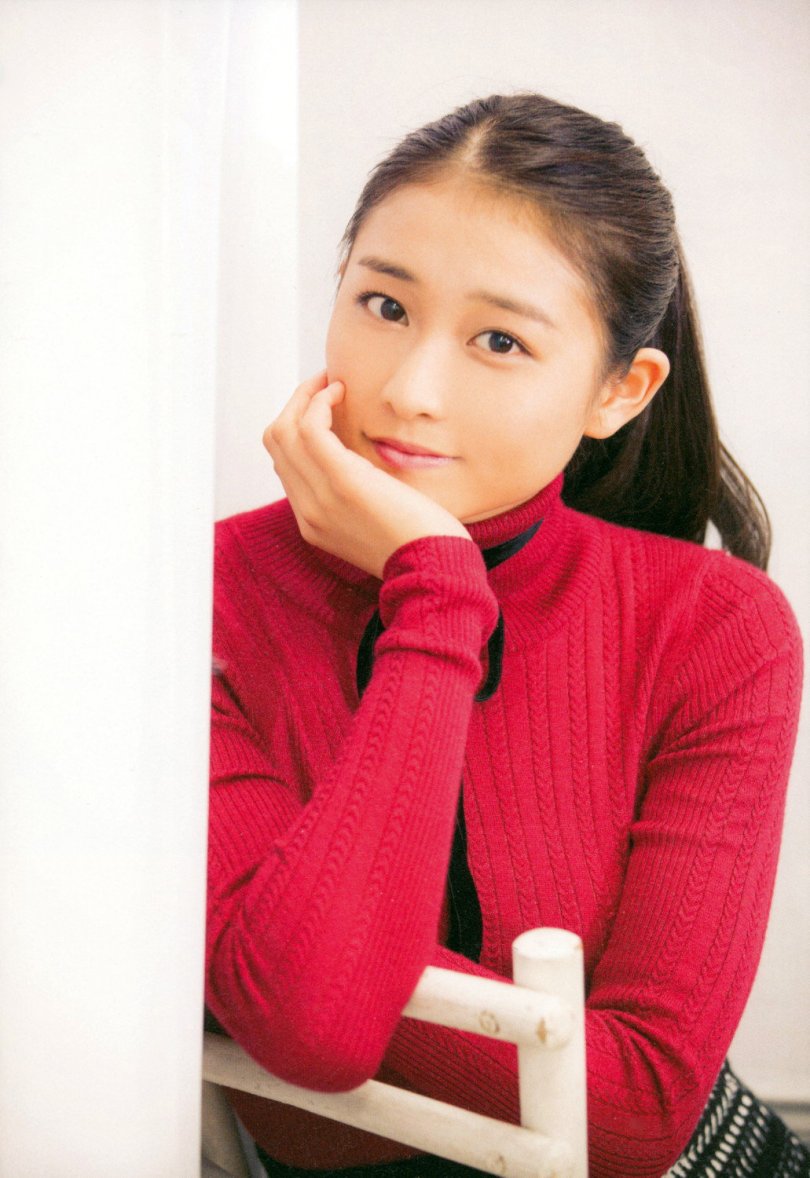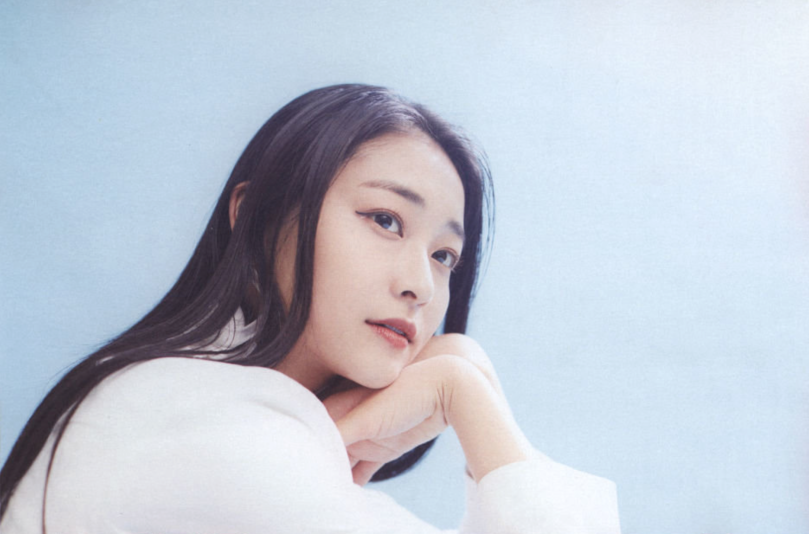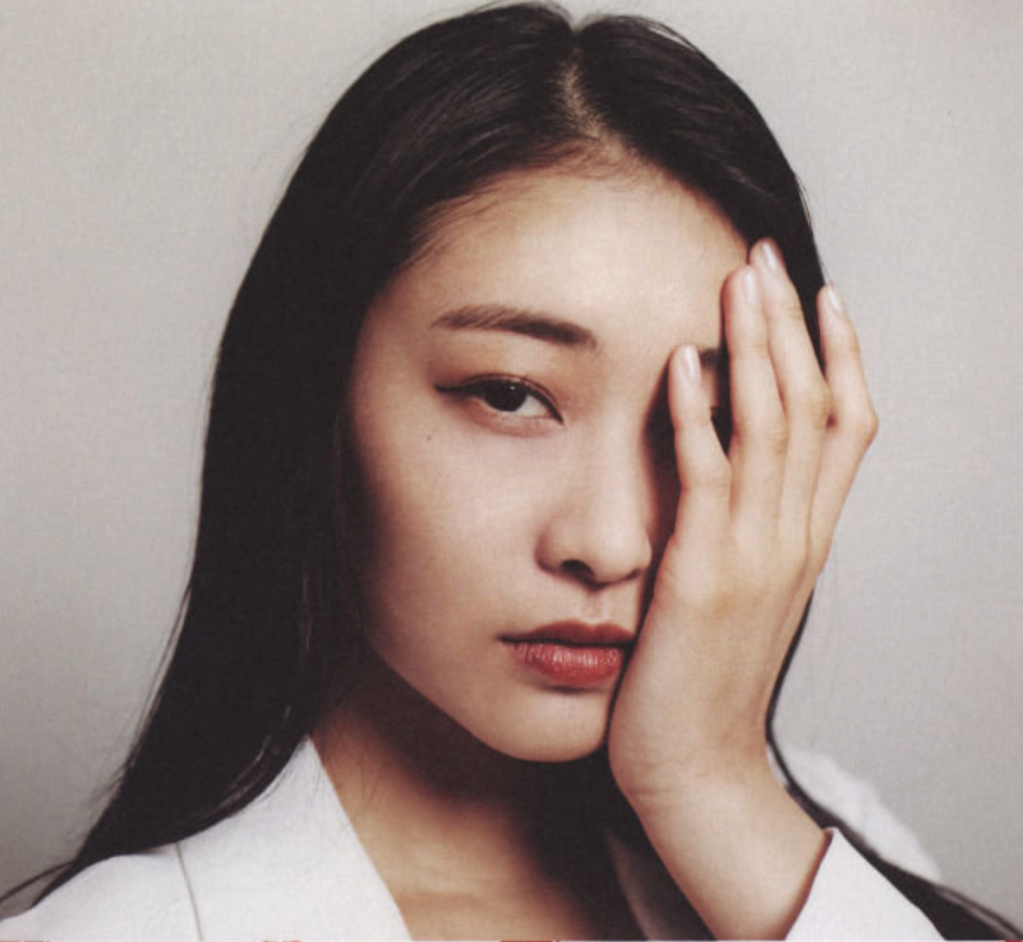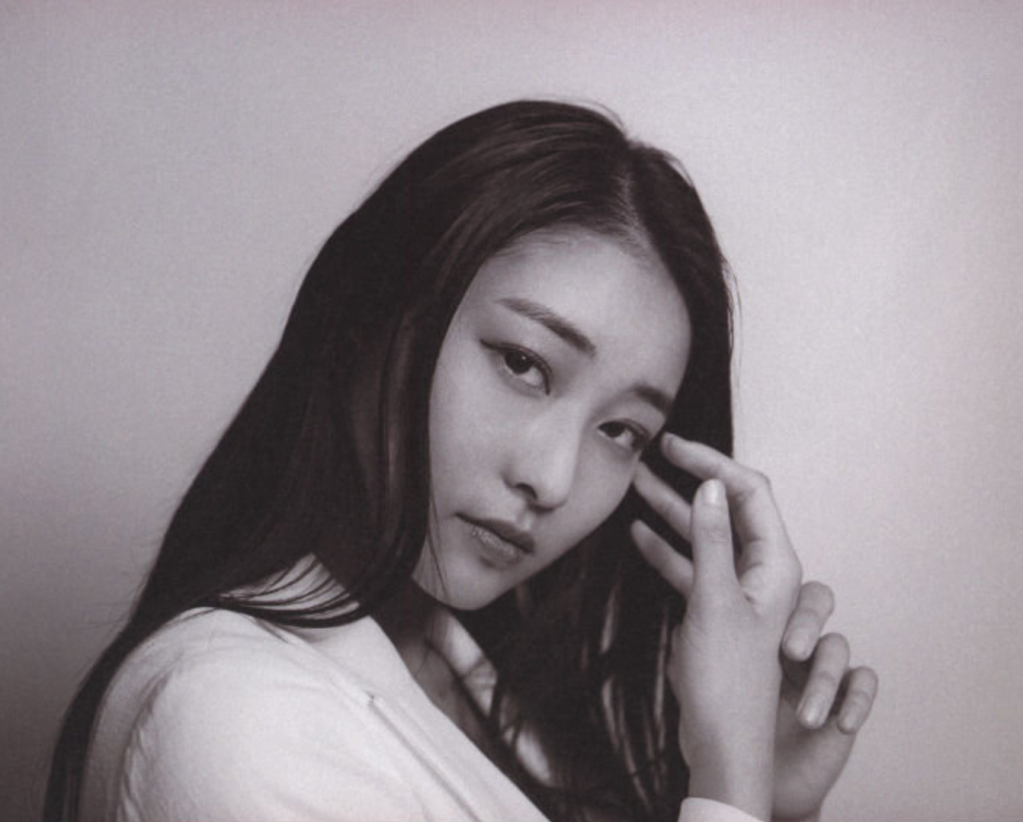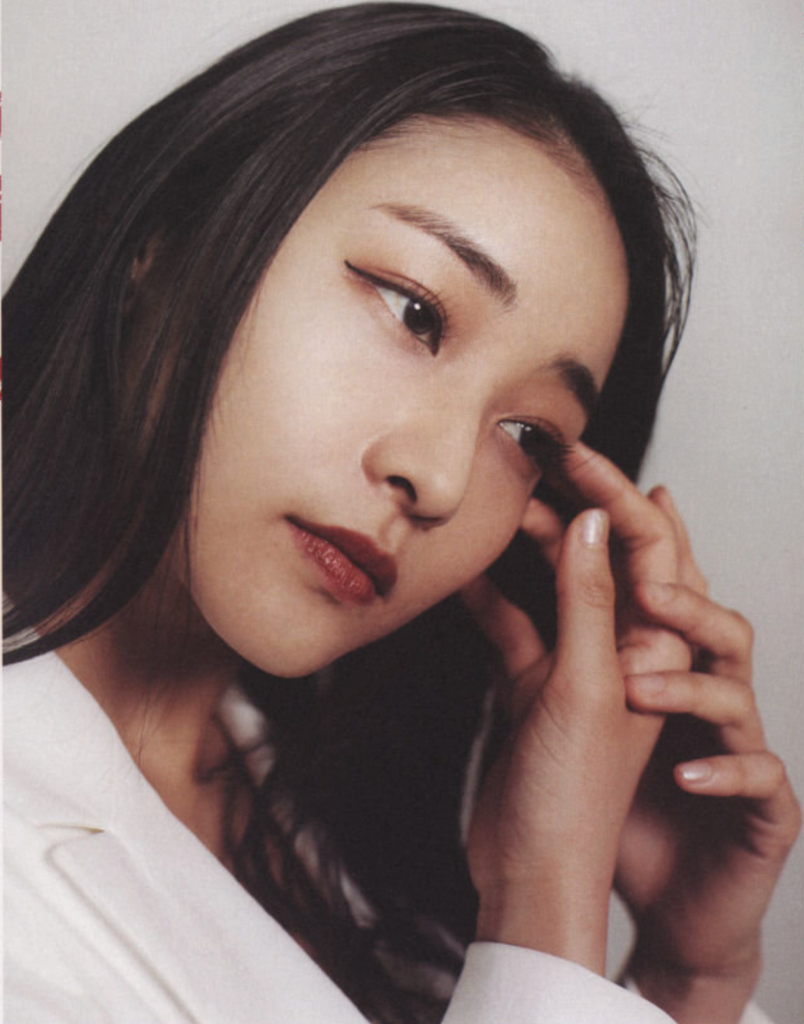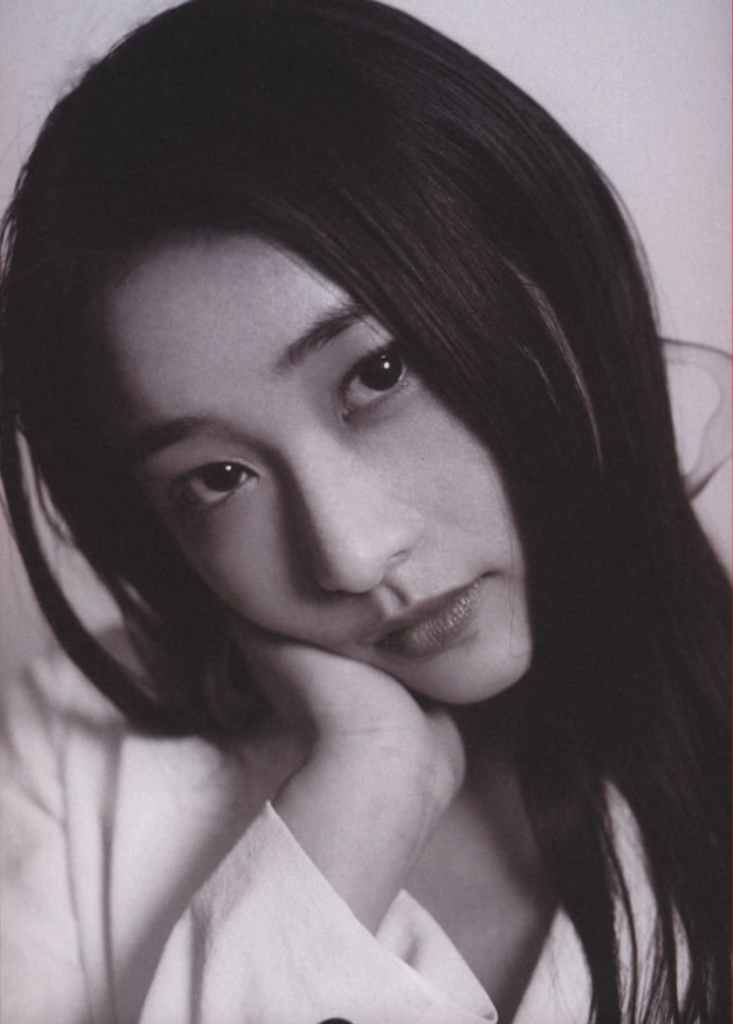This is a translation of an article that was originally published in IDOL AND READ #005 (December 2015).
S/mileage had a fantastic start. After their formation in 2009, they had their major debut in 2010 and received getting the Japan Record Best Newcomer Award. However, things didn’t go as planned… Risking it all, the group changed its name to ANGERME in December 2014 and welcomed three new members. It was a fresh start with a new line-up of nine members.
Wada Ayaka is the leader of ANGERME. This long interview will discuss her upbringing, her journey in the group, and ANGERME’s future after Fukuda Kanon’s graduation.
— As we’re speaking, ANGERME is in the middle of a tour called ANGERME LIVE TOUR 2015 SUMMER/AUTUMN ~FIGHTING NINE~, which happens to be the last live tour with this line-up. What thoughts do you have during your performances?
Wada: It’s our first time performing as nine members in many of the places we’re visiting, so fans finally get the opportunity to see us. I’m happy fans can see us again with our current line-up. Just a year ago, we had six members, and it makes me realize that we’ve really changed. Right after this, we’ll be going on our long-awaited hall tour, and I’m extremely excited about it.
— Does it make you emotional knowing it’ll be your last time touring with Fukuda Kanon?
Wada: No, I don’t feel particularly sad about it right now. Nothing has changed… We’re just as chaotic. (laughs) Kanon still looks the same as ever, and we’re going just on with our activities and having fun. Hopefully we’ll keep on having fun during her graduation concert at Budokan, too.
— ANGERME is in a transitional period. How do you feel about the state of the group right now?
Wada: No matter what, my opinion doesn’t change. I’m in the group and it’s great. I do feel like it’s my second family. We’re spending more time with each other than with our actual family and I really, really adore the members. That’s why I want to stay forever. I want to be here forever and ever.
— S/mileage changed its name to ANGERME, but you’ve been in the group for 6 years and counting your time in Hello! Project Egg, you’ve been an idol for 11 years. Did you think you’d be an idol for this long?
Wada: No, I didn’t think so. I didn’t really want to become an idol in the first place. I just loved Hello! Project more than anyone else and didn’t care about becoming an idol. I watched my seniors’ performances and wanted to become like them, not like any other idol.
— So you saw them simply as performers rather than idols, and that’s what you aimed for.
Wada: Still, when I was in Hello! Project Egg, I didn’t feel a strong rivalry with the other girls. Some were upset and sad when others debuted before them, but I personally didn’t care at all and just congratulated them. If other girls debuted before me, that was just how it was. They were just active in other ways than me. I only felt like this before debuting, though. After that, I changed completely, and I saw other idols, and other groups, as rivals.
— How did you change as an idol in those 11 years?
Wada: I’m getting closer to my ideal self. There were a lot of things I couldn’t do before that I can do now. Life is very different when you’re a trainee and you start your idol activities. Even if you gain experience as a trainee, it’s not all there is to idoling, as there are many things you just can’t do if you’re not a debuted idol. Now that I think about it, I had my major debut five years ago and only after that I felt I was working towards my ideal self. It’s still worth continuing my journey.
— When you say your “ideal self“, what do you mean exactly?
Wada: After my major debut, I decided I wanted to be a cool idol. My seniors back then were Platinum-era Morning Musume and I was strongly influenced by them. I didn’t just wish I could be like them, I really decided that, in five years from now, I’d be like them. I’m just that kind of person. (laughs)
— You looked up to Takahashi Ai, who was the leader of Morning Musume and known for her amazing performance skills, and you wanted to reach that level of coolness, too.
Wada: Yes! I aimed to be like her and it brought me to where I am now. Well, I’m still working towards it. Becoming like my seniors, Platinum-era Morning Musume, is my personal goal.

— Now that we’re at it, let’s talk about your childhood, before you became the woman you are today. Do you have any stories to tell about your birth?
Wada: I was born around 10 p.m., and apparently my dad’s first reaction was that I kind of looked like a Jizou (laughs). I was a bit surprised it was the first thing he could think of. Well, I can’t deny most babies look like that. (laughs)
— What’s your oldest memory?
Wada: Hmm… I was three years old… in kindergarden. We were having this long-distance running competition, and my friend asked me to run with them. In my case, though, I’m a fast runner, and I wanted to rank high so I didn’t like the idea of running together. I accepted, but I thought I’d just leave them behind if they were too slow. As expected, my friend was too slow… and (hush-hush) I stopped liking them. (laughs)
— (laughs)
Wada: They were mean so I didn’t like them. Also, when they got tired, they gave up and wanted us to walk instead. I remember ignoring them and sprinting past them. (laughs) I heard them say from behind: “I don’t even care about you! We’re not friends anymore and I won’t talk to you!” I completely ignored them and ran away to place well!
— That’s very much like you. (laughs) What kind of child were you?
Wada: I was shy, and I still am, but it was worse back then. I didn’t want to be seen in public, even when I was in Hello! Project Egg. I tried my best to avoid cameras so I wouldn’t be filmed and interviewed. I was just very shy and couldn’t speak in front of others. Even in school, I never raised my hand. You know how there are people who never ever speak up in class even when someone calls their name? That was me.
— What were you interested in?
Wada: I liked sports. I started swimming when I was three and I also loved running. I even ranked first in marathons. Although I liked swimming and running, I couldn’t care less about ball games. I guess I liked individual sports more. Oh, and I started snowboarding at three and liked that, too. So I didn’t talk to people, but I was active. (laughs)
— So you swam alone, you ran alone, and you slid alone.
Wada: I didn’t like following others. Even it came to clothing, I avoided looking like other people. I was a fashionable kid, actually. I had many clothes, and they were only sold in Tokyo, not in my home prefecture of Gunma. Since I wore them in Gunma, I never had the same clothes as other people. That’s how I rolled. (laughs)
— Looks like you didn’t make friends easily.
Wada: (laughs) I did like playing with people. I played cops and robbers, and tag outside during recess every day.
— When did you first make friends?
Wada: I have a childhood friend, and we’ve been sticking with each other since I was five years old. We lived in the same neighbourhood so it felt like we grew up together. They’re a bit of an airhead and we’re always doing silly things together. (laugh) Anyway, we did things like swimming in the river and riding our bikes as far away as possible. In elementary school, our school set up a perimeter so students wouldn’t stray too far away. We went to the farthest point and played there. In middle school, we didn’t have classes together, but our families were close, so we were always together. We’re still friends today.
— And what about your family?
Wada: My family is my dad, my mom, me, my little sister, our dog, our cat… and our pet bird, our little Piichan. My mom is super scary, and she often yells: “WHAT ARE YOU DOING?!” My dad is very kind, but he did get mad at me once. I didn’t like wearing turtlenecks, so I told him in a childish way: “I’m not wearing that!” We were about to leave, and I was just shouting: “No, no! I’m not going!” He got mad and said: “Hurry up.” That was the only time my dad ever got mad at me. (laughs)
— He seems so kind. From what you said, I guess your mom was strict?
Wada: Quite strict. When I was a child, grandpa and grandma lived with us, and even my great grandma until she passed away. Grandpa was extremely strict too. For example, when we were eating, he was so strict with manners that even my mom was like: “Don’t listen to him too much.” Thanks to him, though, I learned politeness and good manners. And my mom, well, what did she scold me for… She was just always mad. (laughs) Ah, she often scolded me when we commuted to Tokyo for my Hello! Project Egg activities. We rode the bullet train, and I had this bad habit of sitting with my legs wide open. She’d always shout: “Don’t do that!” Back then, I didn’t realize spreading your legs was bad manners. (laughs)
— How is it now?
Wada: I’m doing fine so she isn’t worrying about me, but my younger sister is a mess so she gets mad at her. I’m an airhead, but my sister is worse. She’s very easygoing, and I’m the one teaching her stuff now. We’re really close, though, and we’re spending a lot of time together so we do silly stuff. Neither of us makes any sense. We’re nonsensical together.
— By the way, how does your family feel about your idol activities?
Wada: I don’t know, because I never say a word about my job to my family. They do know I’ve been a fan of Hello! Project since I was a child because they brought me to concerts. After I joined Hello! Project, I didn’t like people asking me questions about work, and I don’t even say anything to my friends or my family. I’d even tell them not to come see me at concerts, and if they come, I look the other way while dancing… I’m well aware that I’m not supposed to do that. For instance, I was backdancing on the runway at Yokohama Arena, and they were in the family seating area. They were right in front of me, but I looked away and just danced. (laughs)
— Were they supportive of you becoming an idol in the first place?
Wada: I did love Hello! Project, but like I said before, I didn’t think about becoming an idol. My mom suggested I should audition and that’s how I found my way to the audition. So naturally, my mom was supportive of it. Now I realize that she encouraged me all along.
— Was there any time you remember causing trouble to your family?
Wada: It’s related to what I just said. I didn’t really want to be an idol, but they thought that since I loved them, I wanted to be one so they worked hard for me. They brought me to every Hello! Project concert, and since I loved Hamasaki Ayumi, they brought me to her concert every time, too. And, I think it was after I auditioned for Hello! Project Kids, they sent me to a dance and vocal training school for two years. In retrospect, they really supported me as much as they could. I could have been born in a family that didn’t approve of me becoming an idol even if I wished to, so it’s amazing… I feel grateful and I want to give back to them!
— How did you become a Hello! Project fan?
Wada: Hmm… I don’t remember. (laughs) But I think I liked cute concepts like those by Hello! Project and Hamasaki Ayumi. I loved cute stuff. So nothing in particular got me into Hello! Project, but I always watched them.
— They were just a part of your life and you liked them. Did you look up to anyone in particular?
Wada: I liked Yaguchi Mari. Gyaru fashion was very popular back then, and I wanted to be a gyaru, too. I wore loose socks, cute platform boots and I dressed up as Mini Moni. What made me like Yaguchi Mari was that she had blond hair. I thought she was cute when I was a kid.
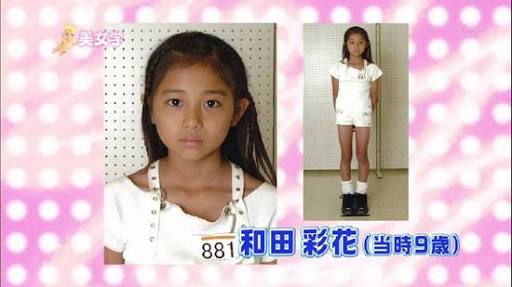
— When you finally entered your beloved Hello! Project, what kind of place was it?
Wada: It was so fun. I never thought it was harsh or different from what we saw from the outside. It could be that, because I wasn’t interested in debuting, so I couldn’t be frustrated about not debuting. I thought what I was doing was fun enough as it was.
— So you simply enjoyed being close to what you loved.
Wada: That’s exactly it! I just fangirled like: “My senior is just over there!” or “She talked to me!!!” I still had fun after joining, or should I say, I had even more fun after joining!
— You said you were a kid who didn’t like to be in front of other people. How was your first time on stage?
Wada: I was so embarrassed. When I was a trainee, I was lumped with all the other Hello! Project Egg members, so my name never came up individually. All the others were like: “I gotta make them know my name fast!”, but in my case, I didn’t want anyone to know my name. I even challenged myself to be there without ever saying my name! (laughs) In the dressing room, there were hangers with a picture of us, and mine had my name “Wada” was written on it. Around that time, more girls were saying their name on stage and stuff, so it made it easier to identify us. That’s how my name “Wada” was revealed, and I was extremely frustrated! (laughs)
— So you lost the “they’ll never know I’m Wada Ayaka” fight. (laughs)
Wada: If only they didn’t put up that picture!
— It took about five years, until 2009, for you to debut as a member of S/mileage. Did you work hard believing you could debut someday during that period?
Wada: No, because I was embarrassed to appear in public so I thought I’d quit after starting middle school. I never told my mom about this, though, I wasn’t brave enough! I asked myself every day how I should tell her, what words I should use, but I never mustered the courage to say anything. That’s how I ended up here.
— (laughs)
Wada: Although I was shy, there was nothing I disliked. Our activities were so fun, I enjoyed dancing and I had a blast while singing too. I had regular weekly lessons with other girls around my age, and we eventually had trainee concerts so we had even more of a chance to be together. It felt like school and it was really fun. The only bad thing was that I was embarrassed, really!
— Were you thinking: “I’m embarrassed! I’m so embarrassed!” while dancing and singing on stage all the time back then?
Wada: Yes. (laughs)

— When you were chosen to debut in S/mileage, were you prepared for that?
Wada: No, my mindset only changed when we had our major debut. I did think it was great being in a group because I could do the same activities as my seniors. Still, when they told us “You’re releasing a CD as an indie group”, I had no clue what “indie” meant, and I didn’t know the meaning of “debut” either. It was like I was active while being completely unaware of what I was doing. When we were releasing a CD, we were told to strike poses and make facial expressions that were never taught to us before, like for CD jackets and stuff. I was really awful at that, because I was embarrassed to stand in front of the camera and smile.
— Sounds like you weren’t meant to be an idol. (laughs)
Wada: I wasn’t. (laughs)
— Yet, even if you weren’t meant to be an idol, you still worked hard in your own way?
Wada: I didn’t enjoy looking at the camera and smiling, and what I disliked above all was to look at my pictures. Like, they were showing me pictures of my weird face?!
— Your weird face. (laughs)
Wada: It made me angry. I could neither do or stand it. I thought: “Is it really this hard releasing just one CD?” I really disliked photoshoots, as they’d show me my pictures again and it couldn’t possibly be more embarrassing. You know, for CD jackets, we’d be striking poses and I was really embarrassed to look at me making them!
— How did the other members feel? Were you the only one who was embarrassed?
Wada: Yes, I was. The others were surprisingly good at making facial expressions. I was the only one who was bad at it, and I hated it even more when I was told I wasn’t good. I was really embarrassed.
— So you must have been extremely embarrassed by S/mileage’s concept, “the idols with the shortest skirts in Japan.”
Wada: Well, after our major debut, my mindset changed. I was actually the most pumped about it and not embarrassed at all.
— How did your mindset change, exactly?
Wada: Our manager was very strict after we had our major debut, but thanks to that, we learned a lot. I realized that we had come such a long way. Also, our Morning Musume seniors were close to us, and I decided I wanted to become like them! As an indies group, we were performing as the opening act at our seniors’ concerts, and that’s how I grew to think like that. I changed my mindset: I had no reason to be embarrassed.
— S/mileage’s debut was during the idol boom, with AKB48 having their big break and Momoiro Clover rising as well. It felt like S/mileage was Hello! Project’s answer to these groups so they wouldn’t lose to them. Did you feel like this yourself?
Wada: No. Nowadays, I look back and think it was a big deal, but back then, it was all so new for us. It was our first time on TV, our first time performing on music shows, our first time doing everything. We didn’t have time to look at S/mileage objectively. We were taught everything and received advice like “It’s like this” or “You got it wrong”, so we had to follow and couldn’t catch our breath. We didn’t know anything about ourselves.
— Yet, the four of you were fearless. I have this memory of you guys fooling around all the time.
Wada: The first time we were on TV, we were still an indies group, and I got scolded because I didn’t say anything. They told me why it wasn’t good to keep quiet, and gradually, it all got into my head. So, I tried to speak no matter what and that’s how we got that kind of image. All because back then, they got mad at me for not speaking. I didn’t want them to get mad at me, so I just said whatever. (laughs) Also, I was the leader, but I was super ditzy and didn’t know at all how and when to talk. I couldn’t come up with anything, so our staff told me what to say. Then, I’d tell them I wanted to say something, and they’d reply: “So, you should say it like this” or “Okay, well, people won’t care.” We had these conversations which helped me learn so much and I’m grateful for them.
— When you think about the four of you now, how do you feel?
Wada: We were babies. (laughs) We thought we could do everything by working hard, that the more we worked hard, the more the spotlight would be on us. The first time we appeared at an event with multiple idol groups, we were told we were the “best.” It made us so happy, and we believed it, too. We thought that the more we worked, the farther we could go, and we genuinely worked hard for that.
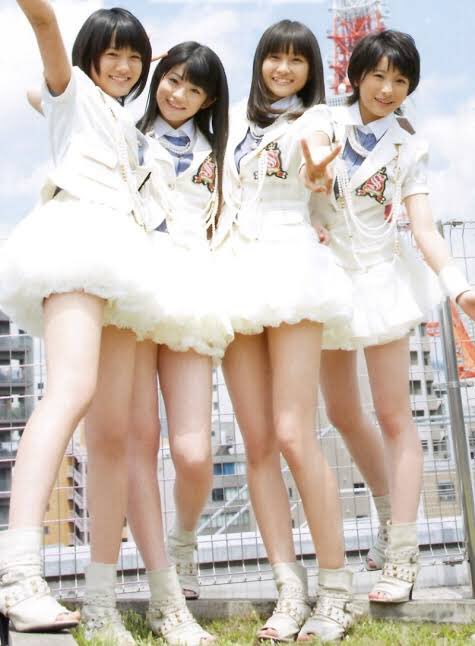
— S/mileage got more attention than Morning Musume around that time, too. In 2010, as soon as you had your major debut with “Yume miru 15”, you won the Japan Record Best Newcomer Award. How did you react to this?
Wada: I was overjoyed, like: “I can’t believe it… Us?!”
— The four of you had a look of pure happiness on your face. I watched the video recently, and there was an emotional part where you said smoothly: “We’re getting the grand prize next year.”
Wada: Did I say that?!
— You did. (laughs) Let’s move on to another topic. Before you were Japan’s best new idol group, you were living your life as a student. How were your elementary school days?
Wada: I played and chatted a lot with people in my class. I was extremely shy with people I didn’t know, but I played with my friend group. I wasn’t the type who stood out. I wasn’t a part of the flashiest group of our class, and I wasn’t friends with those people either, but I was peppy and happy. I played the long jump rope, and playing house was popular too…
— As in, “I’ll be the dad and you’ll be the mom?”
Wada: I was the pet.
— You weren’t even human. (laugh)
Wada: I just sat and watched them as they talked.
— Was that fun?
Wada: If you’re the mom, you have to say stuff like: “do your homework.” If you’re the dad, you say: “that’s right”. If you’re the big sister, you must kind of act like one. I thought it was embarrassing, having to act like that. So I liked being the pet. I could look at people, just go “woof!” sometimes (laughs) and move if someone they said “let’s go”. It was fun.
— How was it in middle school?
Wada: In my first year of middle school, I was in the track and field club. I ran 800 meters and even took part in competitions. In my second year, though, I was chosen for Shugo Chara Egg and couldn’t attend the club as much as before. Then, in my third year, I got so busy with work that my teachers gave me extra support. Towards the end, it made me so sad that middle school was ending already. Time went by so fast. I had good friends and did my best so I could attend as much as possible.
— So you enjoyed school.
Wada: I did. I realized how wonderful my everyday school life was in my third year. Going to school, taking classes, cleaning up with everyone, attending afternoon homeroom, going back home with my friends. It was so great being able to do this. When I had work, even if I took the very last class until the very last minute, I had to leave immediately and couldn’t clean and attend afternoon homeroom with everyone after school. That’s how I realized how fun it was staying in school until the end of the day and going back home with everyone at the same time. I had to relish this time because it would be gone soon. I’d be graduating and it’d all be over. I had to take it in by asking myself: “After today, how many times will I be able to enjoy this everyday life?”
— What’s your favourite memory of middle school?
Wada: My third year, for sure. I had what you’d call a squad…
— What’s a “squad?”
Wada: A group of friends I was always hanging out with. We were six girls and we still hang out even today. I was with them in my third year for the most part, so looking back, being with them in my third year was the best thing about middle school. Third year itself was just fun! I was in the same class as all the girls I was friends with. I had a blast.
— Oh, is that why you wrote that angry blog post when you couldn’t go to your coming-of-age ceremony because of work?
Wada: Yes. (laughs)
— Coming-of-age ceremonies are basically middle school reunions, after all.
Wada: Exactly.
— S/mileage must have been a big part of your life in high school, too.
Wada: We had our major debut in my first year of high school, and we were extremely busy with our activities in my second year. In my case, I decided I wanted to go to university in my first year so I studied for entrance exams in my third year. My only memory of high school life is this, university entrance exams. I had one-on-one classes with my teacher so I didn’t have friends in school, but my teacher was kind of like a friend. They always worked with me and encouraged me to come by when I could. If I could only be there in specific timeframe, they’d tell me to come anyway. I never studied so my reading comprehension was below that of an average person. Still, they managed to work with that, found readings for me and even bought me some books.
— It sounds like they really worked hard with you.
Wada: Those books were all used, and I have a good story to tell related to this. I had planned to go to an art school, so I just studied everything that had something to do with art. I wrote 3 essays of 2000 characters every day and it was hard, but my teacher really did all they could to support me. Thanks to that, I passed the exams, and to celebrate, my teacher bought me brand-new books for the first time! They gifted me three books they recommended. I was so happy.
— So in university, you majored in art history as you wished. What made you choose art in the first place?
Wada: One day, in my first year of high school, I misunderstood our meeting time for work and had a lot of time to spare. At Tokyo Station, the walls were plastered with posters for a Manet exhibition. My mom, who came along, was intrigued by the posters, and I was also strangely attracted to them. When I entered the exhibition hall, I saw a world way beyond imagination. I thought it was so fun and amazing, I started going to art museums without knowing anything about the different genres of art at first. I eventually learned more about them, and I found out about art history. It sounded great, so I decided to go to art school.
— Is this how you got interested in Buddha statues as well?
Wada: Yes. I was studying for the university entrance exams and learned about Buddha statues, but I didn’t care about them all that much back then.
— (laughs)
Wada: Well, I’m bad at reading kanji, couldn’t tell their faces apart and didn’t know anything about the different types of statues. They all looked the same to me. My teacher told me to look at the exhibition catalogue, so I’d look at it every day reluctantly and I still couldn’t understand the point of them. Then, my teacher gave me some advice. They taught me that Tathagata statues have achieved enlightenment, so they’re not decorated. Also, Bodhisattva statues are a bit greedy so they’re not enlightened and have a lot of shiny things on them. It made me look at statues in a different light and the exhibition catalogue actually made sense from that point onwards! I learned how to read their names naturally and figured out all the different types, but I really realized how fun they were when I could tell their faces apart. I was drawn to them, so when I finished studying for my exams, I asked my mom to go see Buddha statues with me in Kyoto and Nara. During that trip, I couldn’t believe I wasn’t aware there were such wonderful things in Japan! And that’s how I got into them.
— What a great story. You weren’t interested in them at all, but ended up loving them.
Wada: It all happened in a flash and opened my eyes.

— Let’s go back to your teenage days, in S/mileage. What memories do you have of your time with the original members?
Wada: It was like a dream. We were heavily promoted after our debut, so much our faces were plastered around the Yamanote line. People would tell us there were pictures of the group everywhere around the city, and we were invited on TV shows. We were making headlines for everything we did and a hall tour was announced for us after our debut. We were blessed with a good environment, but it only lasted for a year. When I look back at that time, I can’t believe I actually experienced that, because it really was like I was living a dream.
— In August 2011, Ogawa Saki left the group, and Maeda Yuuka graduated a few months later on December 31st. How did you feel when you heard they were graduating?
Wada: …I was mostly sad that we wouldn’t be the four of us anymore. Even if just one person left, the balance of the group wouldn’t be the same. This feeling we created together, it was just so cute. Rather than being sad that they were graduating, I was heartbroken to see this S/mileage with four members change.
— So for a long time, you felt you couldn’t move on?
Wada: No, actually, I didn’t feel like this. The second-generation members joined right after, and before we knew it, we hit rock bottom. I thought we couldn’t afford living in the past in such a state. We used to have a schedule that was so packed with activities, we barely had a day off. Afterwards, though, we had weeks with nothing planned, and I even told our manager they didn’t need to lighten our workload so much. That’s when I learned that they were making us work less because there was simply no work for us. There were fewer people coming to see us and our venues were smaller. At every release event, I could tell there were fewer fans attending. I wasn’t “sad” about this, however. I was just trying to find out why it happened when we were doing so well!
— How did the group recover from this slump?
Wada : Ever since we had four members, we were dragging ourselves and figured things out along the way by working hard. So we thought that by working hard, we could pull through, people would see it and we’d be able to do hall tours again. But it didn’t happen, and I only realized it in the fall of 2013. Before that, I was busy helping the second-generation members settle in. For example, I was helping Kananan (Nakanishi Kana) learn how to dance. Also, after we lost two original members, I was often told that I looked upset and lacked energy. I didn’t notice it at all myself, but I was like that at that time.
— This era of S/mileage with the second-generation members must be why the group was renamed ANGERME and new members joined. How do you see this era nowadays?
Wada: There were many things we couldn’t do and weren’t acknowledged for, yet things made us very happy. We became who we are now thanks to this era. I’m repeating myself now, but I’m glad I could experience it with those members. It brought me happiness.
— You said previously that you love the second-generation members so much, you’d want to marry them. Is it because you went through this era together and bonded?
Wada: You’re right. We’re not generation mates, but we’re a “family of six.” The six of us experienced it all together as one. Still, I’m sad for the second-generation because they couldn’t really taste glory. Original members like me just worked hard and made it, but the second generation joined at our lowest point. I feel sorry for them.
— I believe things have changed for the better since you became ANGERME, but how do you feel about it? Are you happy things have changed?
Wada: I’m glad people are seeing us in a new way, but I don’t think the group has become drastically better. The group didn’t suddenly become better after the third generation joined, it’s more that we’ve grown gradually since we were six members. Our last days with six members were also great. We performed at Budokan, and before that, we did a musical called Warera Jeanne, and it was a big thing for us. It was the first time the six of us were in a musical, and we did it alongside Berryz Koubou and many other performers from other agencies. We were the least experienced and didn’t want to drag down the others. Sometimes, Berryz Koubou had scheduling conflicts and couldn’t come, so we had to fill in. Of course, we weren’t used to singing musical songs and fighting on stage either, so we had to learn how to do it. We also had to learn two characters because there was the “Reverse” version as well. For us, it was an incredibly hard experience, but our bond became stronger thanks to it. We really helped each other out, which made S/mileage evolve.
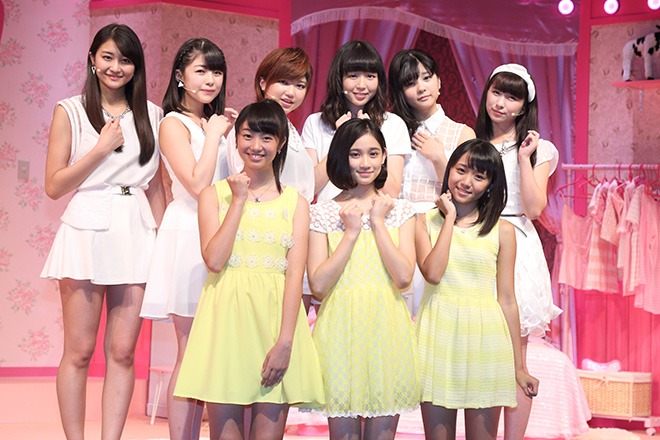
— What did you think about the new members that joined afterwards?
Wada: Our six members were full of personality, and the three new members also had a lot of personality. I was happy they joined. It’s especially fun that they’re not holding back and are chatting freely with us. We were also doing that in the dressing room as seniors so we’re all chatting together now. Hopefully they’re having fun with us. (laughs)
— Now you’re the leader of a large group. How do you want to see the group change?
Wada: I want it to keep going, and that’s why we changed our name and new members joined. I’d be happy if it kept changing, but… as far as I’m concerned, I’m not letting it go!
— I see you’ve made your mind. You know, now that Fukuda Kanon is graduating, fans are speculating you’re going to follow suit…
Wada: Nope! I’m here to stay!
— (laughs)
Wada: Because we’re not like Morning Musume yet! We’re not like Morning Musume in that era!
— You’re really amazing.
Wada: When we’ll reach that point… I might reconsider. (laughs) But I’m not leaving until I’m fully satisfied with my performances! I love singing and dancing and I want to keep doing that as much as I can.
— On November 29, 2015, you’ll the last remaining original member. Do you feel anxious or sad thinking about it?
Wada: Not really. I don’t feel this way because I’m confident in the second generation’s abilities. I know it’ll be fine during MCs and when we’re all dancing together. We have our bond from when we were just six members, so I’m not worried. The only thing that worries me is the memories I’m losing, like what we were told in a specific venue, when they got mad at us, what we did back then. I’m all losing that. Kanon is always helping me remember, she always says : “hey, it’s THAT place!”
— So, the people who remember the history of the group will be all gone after she leaves? (laughs)
Wada: Yes, so I’m asking her to remind me what happened in this venue by email every time. (laughs)
— I have one last question. As a member and as the leader of ANGERME, what do you want to accomplish?
Wada: I want our group to do hall tours on a regular basis. We’re doing a hall tour now, and it’s the first time in a while. It’s a new beginning for us and my dream is coming true, but it’s not quite fulfilled yet. We could be doing a hall tour now, only to go back to live houses again. When you think about our history, you know there’s a chance it could happen. So I’d like us to do them regularly, and if we can do a concert at Budokan on top of that, then I could feel we’ve achieved something together with our own strength. Now, we’re only doing a special graduation concert, and if there are no plans for one, we can’t be there. I’d like for us to reach a point where if we’re not there every time, something’s missing.
